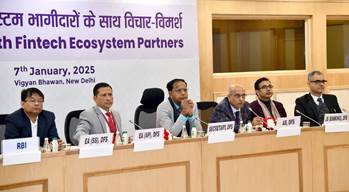Secretary, DFS chaired a meeting with Fintech Ecosystem Partners, in New Delhi. The meeting was also attended by senior officials of RBI, NPCI, FIU-IND, MeitY, and around 60 Founders/ Co-Founders of various Fintech entities and Fintech Associations

FinTech BizNews Service
Mumbai, January 7, 2025: Shri M Nagaraju, Secretary, DFS, M/o Finance chaired a meeting with Fintech Ecosystem Partners, in New Delhi, today. The meeting was also attended by senior officials of RBI, NPCI, FIU-IND, MeitY, and around 60 Founders/ Co-Founders of various Fintech entities and Fintech Associations.
The engagement with partners from the Start-up and Fintech ecosystem was designed to foster an open exchange of ideas aimed at elevating the Fintech sector to a global standard. Throughout the discussions, there was a strong emphasis on the need for Fintech companies to consistently deliver innovative solutions to the financial services industry while adhering to strict regulatory compliance.
Secretary, DFS stated that the Government has taken up various initiatives to create an enabling environment for the Fintechs. It was noted that Aadhar, UPI, AePS among others have acted as enablers for FinTech sectors. Similarly, Regulatory sandbox, Fintech repository, SRO Framework for Fintech, etc have facilitated the fintech eco-system in India. RBI also informed that various initiatives have been taken at their end including developing an Emerging Tech and Fintech Repository for capturing baseline information in a secured and confidential manner, launched Unified Lending Interface (ULI) and urged NBFCs to onboard on the ULI platform, conducting regular interactions with fintechs ecosystem and also working on video-based KYC projects in their regulatory sandbox framework.
Secretary, DFS recognized the rapid growth of India's Start-up and Fintech sectors, especially in the last ten years. He pointed out that the digital payment infrastructure plays a crucial role in the fintech industry's expansion, highlighting the need to improve digital payment systems in rural and north east regions, particularly through UPI, and to encourage lending based on digital footprints for MSMEs.